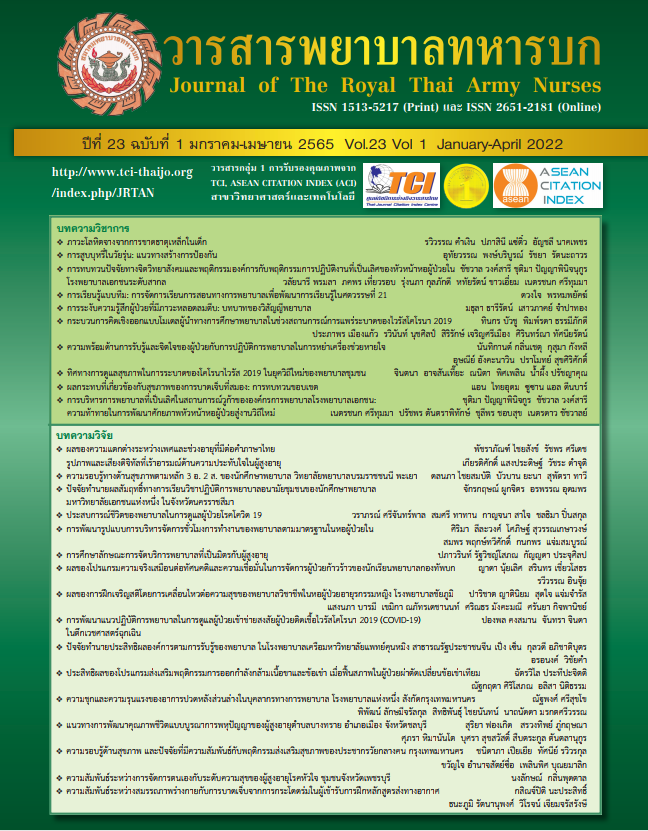Attitudes, Subjective Norms, Perceived Behavioral Control, and Intentions to Food Consumption Behaviors Among Older Persons with Uncontrolled Diabetes
Keywords:
Attitudes, Subjective Norms, Perceived Behavioural Control, Intentions, Older Persons with Diabetes MellitusAbstract
This research was aimed to study the relationship between attitudes, subjective norms, perceived behavioral control, and intentions to food consumption behaviors among older persons with uncontrolled diabetes. The sample consisted of 197 older adults diagnosed with uncontrolled diabetes attending the health promotion hospital in Muang District, Nakhon Ratchasima Province, from July to August 2020. The sample was purposively selected based on the inclusion criteria. The assessment tool measured 4 aspects: attitude, subjective norm, perceived behavioral control and intention to food consumption behaviors. The validity and reliability of these instruments were approved prior to data collection. Data were analyzed using descriptive statistics, and Spearman’s rank correlation coefficient.
The findings were indicated a significant positive relationship between attitudes, subjective norms, and perceived behavioral control with intentions to food consumption behaviors among older persons with uncontrolled diabetes (p < .05, r = .342, .417, and .216 respectively). Thus, the findings can be used as information for health personal to promote food consumption behaviors among older persons with uncontrolled diabetes.
Downloads
References
Zheng Y, Sylvia HL, & Frank BH. Global aetiology and epidemiology of type 2 diabetes mellitus and its complications. Nature Reviews Endocrinology. 2018. 8; 14(2): 88.
Division of non-communicable disease. National strategic health plan for prevention and control non-communicable disease for 5 year (2017-2021). Bangkok: Emotion Art Co., Ltd.; 2017. (in Thai)
Diabetes Association of Thailand. Trends in Incidence of Total or Type 2 Diabetes; 2019 [cited 2019 Sep 20]. Available from: Diabetes Association of Thailand. (in Thai)
Reutrakul S, & Deerochanawong C. Diabetes in Thailand: status and policy. Current diabetes reports. 2016. 1; 16(3): 28. (in Thai)
Ekkaplakorn W. (editor). Report of the 5th Thai Health Survey by Physical Exam 2014. Nonthaburi: Institute of Health System Research; 2014. (in Thai)
Thanakitjaru P, Kateruttanakul P, Sarinnakorn V, & Chuenyong K. Textbook of Medicine Rangsit University. Bangkok Wetchasan Printing House: 2015. (in Thai)
Diabetes Association of Thailand [Internet]. Incidence of type 2 diabetes; 2020 [cited 2020 Jan 19]. Available from: Diabetes Association of Thailand. (in Thai)
Panjama O. Situational of Promoting Glycemic Control Among Older Patients with Diabetes Mellitus, Inpatient Unit, Nakornping Hospital, Chiang Mai Province. Master of nursing Science [Thesis]. Chiang Mai University; 2013. (in Thai)
Deerochanawong C, & Ferrario A. Diabetes Management in Thailand: A literature review of the burden, costs, and outcomes. Globalization and Health. 2013. 1;9(1): 1-18. (in Thai)
Phomserance T, Yamasun S, & Wongsa S. Effects of a case management program on self-care behaviors and diabetic retinopathy clinical signs among elderly with diabetic retinopathy in quality elderly clinic. Journal of The Royal Thai Army Nurses. 2018; 19 (Suppl 1): 110-118. (in Thai)
Pholuthai T. Effects of Self-Care Behavioral Modification Program for Blood Sugar Control Among Elderly Patients with Type 2 Diabetes Mellitus in Huaikeng Subdistrict Kumpawapi District Udonthani Province. Master of Public Health [Thesis]. Khon Kaen University; 2013. (in Thai)
Schwartz NE. Nutritional Knowledge, Attitudes, and Practices of High School Graduates. Journal of the American Dietetic Association. 1975 Jan 1; 66(1): 28-31.
Becker MH. The Health Belief Model and Personal Health Behavior. New Jersey: Charles B. Slack; 1974.
Ajzen I. The theory of planned behavior. Organizational behavior and human decision processes. 1991 Dec 1; 50(2): 179-211.
Chitbud K. Attitude, Subjective Norms, Perceived Behavioral Control, Intentions and Vegetable and Fruit Consumption amog the Elderly in Narathiwat Municipal Area. Master of Nursing Science [Thesis]. Prince of Songkla University; 2549. (in Thai)
Polit DF, & Beck CT. Nursing research: Principle and methods (7thed.). Philadelphia: Lippincott Williams & Wilkins; 2004.
Jitapunkul S. Principles of Geriatric Medicine. Bangkok: Chulalongkorn University Printing House; 1998. (in Thai)
Chaiyasamut S, & Pommala w. Guidelines for Developing Knowledge, Attitude, and Blood Sugar Controlling Behaviors of Diabetic Patients with Non-Insulin Dependence at Pathumthani. Mahamakut Graduate School Journal. 2017; 15(2): 111-123. (in Thai)
Chumkaew K, & Rungsayatorn S. Knowledge, Attitude, and Food Consumption Behavior of the Elderly in Songkhla Province. Kasetsart Journal (Soc. Sci). 2017; 35: 16-29. (in Thai)
Rohani H, Malekahmadi M, Eslami AA, Ghaderi A, Bidkhori M, Raei M, & Zinat-Motlagh SF. Predicting dietary behavior of type 2 diabetics: Application of the theory of planned behavior and perceived risk of diabetes complications construct. Chronic Diseases Journal. 2016 Jan 15; 3(2): 71-78.
Downloads
Published
How to Cite
Issue
Section
License
Copyright (c) 2022 Journal of The Royal Thai Army Nurses

This work is licensed under a Creative Commons Attribution-NonCommercial-NoDerivatives 4.0 International License.
บทความหรือข้อคิดเห็นใดใดที่ปรากฏในวารสารพยาบาลทหารบกเป็นวรรณกรรมของผู้เขียน ซึ่งบรรณาธิการหรือสมาคมพยาบาลทหารบก ไม่จำเป็นต้องเห็นด้วย
บทความที่ได้รับการตีพิมพ์เป็นลิขสิทธิ์ของวารสารพยาบาลทหารบก
The ideas and opinions expressed in the Journal of The Royal Thai Army Nurses are those of the authors and not necessarily those
of the editor or Royal Thai Army Nurses Association.






